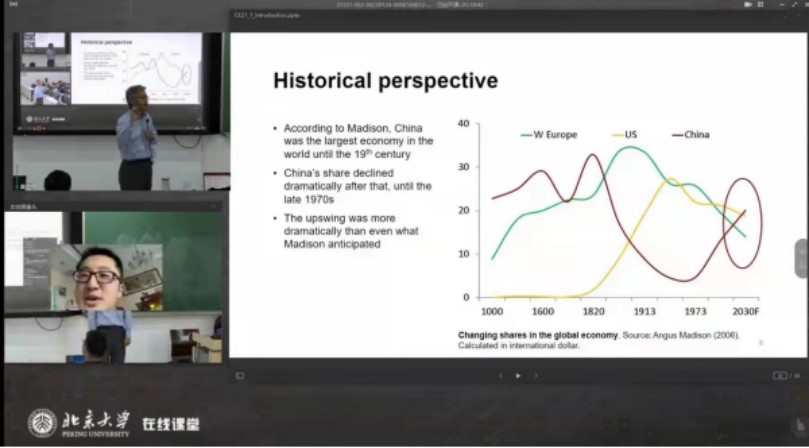Chinese MOOCs share China's digital education achievements worldwide
The spring semester of the Peking University Global Open Courses has kicked off as scheduled. Students from China, Azerbaijan, Japan, Türkiye and other countries gathered in virtual classes at Peking University, waving hello to each other via video link.
Allowing students from different countries to share the same class is exactly the attractiveness of China's massive open online courses, also known as MOOCs.

Photo shows the high-level massive open online courses (MOOCs) donated by China Academy of Art to Indonesia's national MOOCs platform. The courses include Chinese calligraphy and the history of Chinese landscape painting. (Photo from China Academy of Art)
XuetangX and iCourse, renowned MOOCs platforms in China, offer over 1,000 online courses in 14 languages for university students and learners worldwide. They have created over 340 global hybrid classrooms and are working towards mutual credit recognition among prestigious universities.
Starting from 2013, China's MOOCs platforms have launched over 76,800 courses and attracted 454 million registered users. Serving nearly 1.28 billion learners in China and extending their reach internationally, they have not only empowered Chinese students but also contributed Chinese wisdom and solutions to global higher education.
By increasing their global outreach, these platforms disseminate knowledge and, more importantly, showcase China's educational philosophy and promote the diversified development of cultures around the world.
For instance, Tsinghua University launched a global open course named "China's Approach to Poverty Eradication," providing a panoramic picture of China's endeavor on poverty reduction and its contributions to the world. China Academy of Art introduced MOOCs such as "Chinese Painting: The History and Comparison of Chinese Figure Painting " to highlight eastern aesthetics in the exchanges and mutual learning of world civilizations. Shanxi University of Chinese Medicine launched a MOOC on acupuncture in both Chinese and English, which was picked by XuetangX for promotion in Indonesia.
The rich and diverse online courses offer a window into understanding China. Through this window, more and more people can appreciate the profound heritage of Chinese culture and gain a more authentic, multi-dimensional, and comprehensive understanding of the real China.

Professor Huang Yiping gives an online class on Chinese economy on the campus of Peking University. The class is joined by 70 students from 27 universities on five continents. (Photo from the public account of ClassIn on WeChat)
With a global outlook, Chinese MOOCs are sharing China's digital education achievements and promoting exchanges and cooperation among institutes of higher education worldwide.
For example, Southwest Jiaotong University developed MOOCs related to the Belt and Road Initiative, which have trained more than 5,000 rail transit professionals from over 80 countries and benefited over 200 universities and more than 100,000 online learners home and abroad.
Southern University of Science and Technology helped bring smart classrooms to 13 Asian and African countries such as Cambodia and Kenya, providing local students with access to cutting-edge educational concepts and knowledge.
By sharing high-quality MOOCs, promoting teaching collaborations, and deepening international exchanges, China has transitioned from a major importer of educational resources to a major exporter of quality course resources, contributing to the development of a more open, inclusive, and shared educational environment.
At the 2024 World Digital Education Conference, the World Digital Education Alliance was established, joined by 104 institutions from 41 countries and regions. Besides, China's national smart education platform has introduced its international version, providing round-the-clock services for learners worldwide. Education shapes the future, and MOOCs are opening up more possibilities in education.
Photos
Related Stories
- China urges universities to add majors that meet social needs
- China launches crackdown on foul plays in student enrollment
- China to build pilot zones for special needs education reform
- Feature: Teacher guides children with autism toward bright futures
- China launches publication and education campaign to commemorate martyrs
Copyright © 2024 People's Daily Online. All Rights Reserved.









